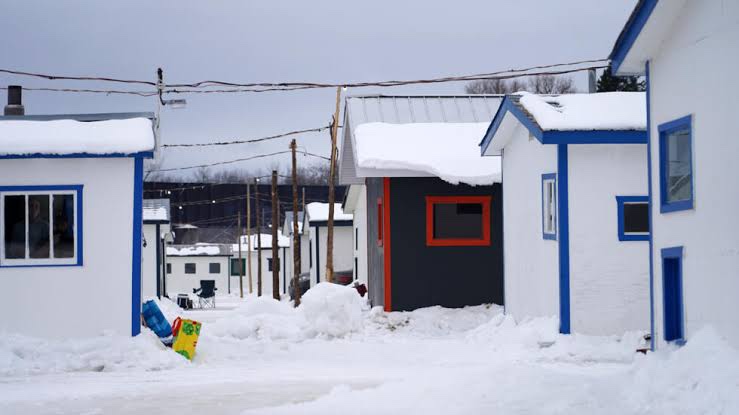Canada’s Ice fishing season delayed by warm weather

In the picturesque landscape of a frozen river in Canada, a cluster of brightly colored cabins stands stark against the white expanse as vehicles inch back and forth. Ice fishing aficionados in Quebec province, weary of waiting for sufficiently cold winter weather, can finally indulge in their favorite pastime.
Traditionally commencing on December 26 and extending until February 18, the season’s onset hinges largely on the arrival of cold temperatures, a rarity in recent years due to the specter of global warming.
This year, the eagerly anticipated start in Ste-Anne-de-la-Perade, located 90 kilometers (55 miles) south of Quebec City, was deferred until January 15 owing to an unusually warm winter. Ensuring the safety of enthusiasts, the ice must attain a minimum thickness of 30 centimeters (one foot) to support the weight of the fishing huts. Steve Massicotte of the Association of Fishing and Hunting Centers notes that this delay ranks among the top five latest starts on record, significantly impacting the region’s revenue, which has plummeted to approximately Can$3 million ($2.2 million).
Rental fees for these huts start at a minimum of Can$140 per day, varying according to occupancy. Within the cozy confines of one such heated hut, Alexandra St-Yves, a 27-year-old doctoral student in anthropology, rejoices as she reels in her catch—an Atlantic tomcod—eliciting jubilant exclamations. Recounting annual family fishing excursions since childhood, she reflects on the joy derived from the sport, reminiscing about years when catches exceeded a thousand fish.
Christian Hivon, proprietor of a local fishing center inherited from his father, laments the capricious nature of what he terms “sawtooth winters,” characterized by erratic temperature fluctuations that often thwart holiday openings. Such climatic challenges have slashed cabin rental revenues by at least a quarter. With resignation, he acknowledges the futility of combating nature’s whims.
Typically drawing around 100,000 visitors annually—primarily Quebecers but also including Chinese and Russian tourists—recreational fishing for small river fish remains a cherished pursuit. Simon Provencher, a 36-year-old amateur angler, attests to the allure of the sport, finding it “much easier” than traditional fishing.
As Environment Canada reports milder temperatures during the initial winter months, with December and January averaging four degrees Celsius above normal, the absence of snow during Christmas underscores the impact of climate change on cherished seasonal traditions.












